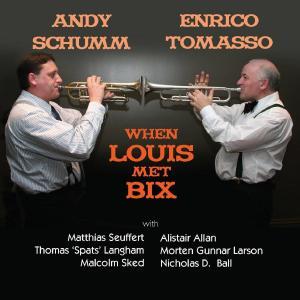 When I assert that this is the best time to be alive if you are a jazz enthusiast, I’m not just whistling Dixieland. I am perpetually astonished by the incredible musical treasures that wash up on the otherwise stark beach that is American popular musical culture. I speak not only of the lovingly-restored reissues of classic and obscure recordings (on labels such as Take Two, Rivermont, and Archeophone) that represent a quantum improvement over the sound of the shellac originals that have been repeatedly plowed with steel needles. I am delighted and deeply grateful to hear performances recorded almost a century ago that pulsate with fresh vitality.
When I assert that this is the best time to be alive if you are a jazz enthusiast, I’m not just whistling Dixieland. I am perpetually astonished by the incredible musical treasures that wash up on the otherwise stark beach that is American popular musical culture. I speak not only of the lovingly-restored reissues of classic and obscure recordings (on labels such as Take Two, Rivermont, and Archeophone) that represent a quantum improvement over the sound of the shellac originals that have been repeatedly plowed with steel needles. I am delighted and deeply grateful to hear performances recorded almost a century ago that pulsate with fresh vitality.
More than salvaged and reclaimed historical audio, what I find truly remarkable is the work of present-day musicians whose technical proficiency, impeccable scholarship, and conscientious determination to Get It Right in the realm of Hot Jazz equal and sometimes surpass the shimmering brilliance (as heard on record) of the originators of the form.
There is so much magnificence today that it begins to feel commonplace. Nonetheless, when I received and played my copy of When Louis Met Bix (Lake LACD 345) a few days ago, I wept tears of joy. Along the lines of the previous alternate-history jazz project Bix Off the Record (Lake LACD339), this new release represents recordings that might have been, should have been, but never were.
The premise is that Bix Beiderbecke and Louis Armstrong met and jammed together in Chicago in 1928, most likely at the Savoy Ballroom, and When Louis Met Bix was initially conceived as a recreation of that jam session. “Soon,” according to the liner notes by Julio Schwarz Andrade, “through research and musical experimentation, we realized we could push it a bit further, to include all contexts in which Louis and Bix would have met.”
Though their styles were dramatically different, the two musicians knew, respected, and loved each other’s work. They saw each other as peers, and in a more racially-relaxed time they would have recorded together. Now, since we’re considering alternative history, let’s imagine a Bix whose health wasn’t precipitously deteriorating through the excessive intake of bad (possibly poisonous) bootleg liquor. And let’s imagine a past where the best cats can get together and play.
When Louis Met Bix might have been an exercise in hokey sentimentality. The excellence of the musicians and their abiding seriousness prevented such treacly calamity. Instead, it is perfect. The phenomenal multi-instrumentalist Andy Schumm, the surrogate Beiderbecke on Bix Off the Record, picks up his cornet again to emulate Bix. But Schumm’s Bix is restored to robust health and inexhaustible creativity. He knows the musical map of Bix’s mind and intuits where Bix would go if only he could. Here, Andy Schumm is Beiderbecke 2.0.
Trumpeter Enrico Tomasso is an Englishman who, as a child, actually met and played for Louis Armstrong and took lessons from him when Pops was on one of his overseas tours. As such, he gets Armstrong’s tone and attack exactly right. At no point as you listen to this CD do you get the feeling you are listening to musicians imitating (or attempting to imitate) Louis and Bix. You are so transported by the delight of this album that you’d swear you’re eavesdropping on those long-ago (unrecorded) encounters.
Providing masterful support to the two principal horn players are Mattias Seuffert (reeds), Alistair Allan (trombone), Morten Gunnar Larsen (piano), Thomas “Spats” Langham (banjo and guitar), Malcolm Sked (bass), and Nicholas D. Ball (drums). “What a band!” says the liner notes, and I concur.
Selections on When Louis Met Bix are apt—and sublime. Many are numbers that either Satchmo or Bix recorded (both made records of “Bessie Couldn’t Help It” in 1930) though some veer into tasty alt-history territory. From the first few measures of “Ol’ Man River” through “Milenberg Joys,” “Chloe,” “Who’s It,” “Manhattan,” “Skid-Dat-De-Dat,” “Come On and Stomp Stomp Stomp,” and all the rest, you’re in Jazz Heaven, and destined to stay there for the next hour and six minutes. The time spent will seem the mere blink of an eye.
One song on the album could not possibly have been recorded by either Bix or Louis—but since we’re in a joyous alternate universe, what the heck. A while back Andy Schumm scored his own composition, “When She Came To Me,” for big band—a big band in which he played all the instruments. The video result of this ten-part miracle of overdubbing is easily found through an internet search, and once you pick your jaw up off the floor compare it to the version on this CD. It really is a lovely tune, and would have been a huge hit in 1928.
This CD, produced by Julio Schwarz Andrade and Paul Adams, was released on April 15, 2016, and is available online through Amazon, eBay, Proper, etc. Our copy came from England, and cost about $17. So, for under a double sawbuck, you get to deliriously happy listening to the most amazing jazz you’ve ever heard in your life. Is this a great century, or what?






















